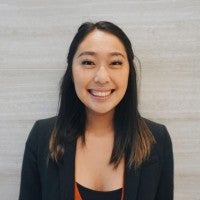
4 Questions with Alumna Joy Chen
Joy Chen is a 2017 graduate of the UCR undergraduate public policy program. During her time as a UCR student, she was the Dean’s Chief Ambassador and participated in the Western Riverside Councils of Government Fellowship Program. She graduated from Yale University with a Master of Public Health degree in 2020, and is now currently Senior Health Policy Analyst at Healthsperien in Washington, D.C. We sat with her to talk about her journey from student to senior policy analyst.
Joy, what did you take away from your time as a UCR Class of 2017 undergraduate public policy student?
It was helpful to be able to curate the education that I wanted and be able to have two different policy tracks to choose from. With public policy, given the general interdisciplinary nature of it, it was valuable to cut across a lot of different topics and have this holistic view of policy. Also, I very much benefited from the ambassador program at the School of Public Policy; I came away feeling more confident in my public speaking, developed my project and time management skills, expanded my ability to work with different personalities, as well as better understand what it means to have a growth mindset. While people can develop subject matter expertise anywhere, what jobs are really looking for are hard and soft skills - and that's something that people generally accrue through different experiences, and I believe the ambassador program helped me attain many of those skills.
You are a proud product of the UCR public policy program who went on to Yale, where you graduated with an MPH. Tell us about that experience.
After UCDC, I fell in love with Washington D.C. and I knew that I ultimately wanted to work there. I figured it would be an easier pathway for me to land there if I went to school on the East Coast so I primarily applied to schools in the Northeast. It was a definitely an eye-opening experience to move somewhere where I did not have a network and where I had to step outside of my comfort zone. The professors, classes, and the general environment helped me grow, but I actually learned the most from my peers because they pushed me to think differently and more intentionally about the issues I care about. I believe that my WRCOG Fellowship where I was placed in community planning made me stand out as an MPH candidate. City planning is very much related to the social determinants of health, and no one had that kind of background in my program.
Tell us a little more about your current position at Healthsperien, how you got there, and what you currently do.
I started off at Healthsperien as a Policy Analyst and then was promoted to Senior Health Policy Analyst about a little less than a year into working. The firm focuses on regulatory and legislative analysis for vulnerable populations, which I was very interested in. I ended up reaching out to a Policy Analyst working there, and that helped me get my foot in the door. As a consultant, in addition to legislative and regulatory analysis, my day-to-day involves a lot of program management such as coordinating work group and internal client calls as well as drafting comment letters on regulations that clients want to comment on. I also help my clients think strategically about how they can expand their business lines and further their outreach to targeted groups.
Many of my clients are provider focused – for example, provider associations and advocacy groups. My focus at the firm primarily centers on provider issues, especially as it relates to Medicare and Medicaid. I also engage in behavioral health work. Our firm runs a few coalitions and non-profits, one of which I help manage which is focused on destigmatizing mental health and increasing mental health access to therapy services. My portfolio also covers long term care, where I help hospices and palliative care providers strategize on how they can expand more of their service areas.
What advice you would give to those who might want to follow your path?
Never think of your path as anything linear. If you're in public policy, it can be difficult because there is no direct path, and I think that's kind of the beauty of it. Public policy is a huge world where you can really go into anything. Even within public health, you can choose from a variety of specialties such as epidemiology, biostatistics, social and behavioral sciences, etc. There is just so much you can do, and I understand how that in itself can be intimidating. However, don’t compare your path to others, and appreciate that there are many choices that you can make - and honestly there isn't a wrong choice to make. I took a year off school to do my fellowship and I was grateful for that time. There can sometimes be a stigma associated with taking some time off, but that was probably one of the best decisions I had made. I think it's much better when you know what you want generally, what your interests are, and the skills you want to build. I truly believe you get that when you can work for a bit and see what you do and don't like.
Joy can be reached via email at joysengchen@gmail.com.